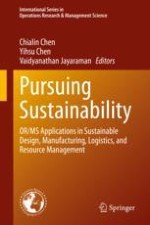2021 | OriginalPaper | Chapter
7. Sustainable Supply Chain Management: Research Pathways Based on Empirical Evidence from Chinese Automotive Companies
Authors : Lin Wu, Nachiappan Subramanian
Published in: Pursuing Sustainability
Publisher: Springer International Publishing
Activate our intelligent search to find suitable subject content or patents.
Select sections of text to find matching patents with Artificial Intelligence. powered by
Select sections of text to find additional relevant content using AI-assisted search. powered by
